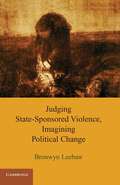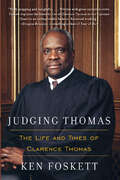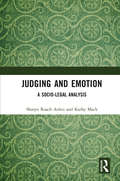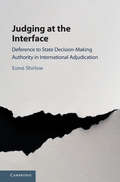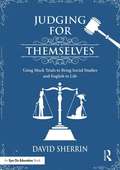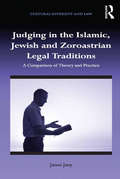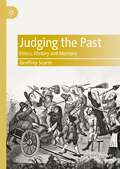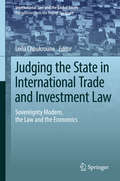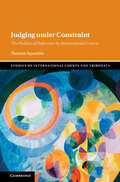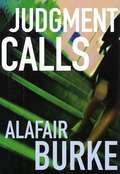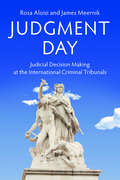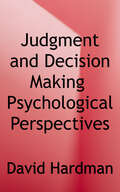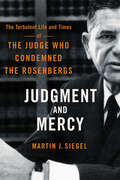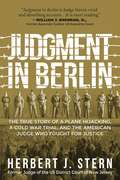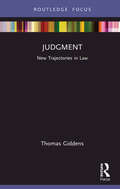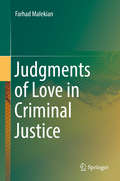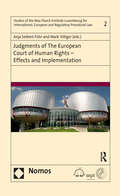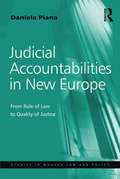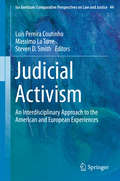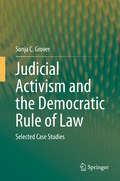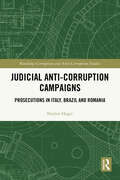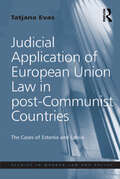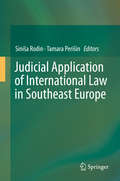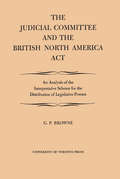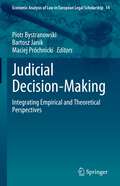- Table View
- List View
Judging State-Sponsored Violence, Imagining Political Change
by Bronwyn Anne LeebawHow should state-sponsored atrocities be judged and remembered? This controversial question animates contemporary debates on transitional justice and reconciliation. This book reconsiders the legacies of two institutions that transformed the theory and practice of transitional justice. Whereas the Nuremberg Trials exemplified the promise of legalism and international criminal justice, South Africa's Truth and Reconciliation Commission promoted restorative justice and truth commissions. Leebaw argues that the two frameworks share a common problem: both rely on criminal justice strategies to investigate experiences of individual victims and perpetrators, which undermines their critical role as responses to systematic atrocities. Drawing on the work of influential transitional justice institutions and thinkers such as Judith Shklar, Hannah Arendt, José Zalaquett and Desmond Tutu, Leebaw offers a new approach to thinking about the critical role of transitional justice - one that emphasizes the importance of political judgment and investigations that examine complicity in, and resistance to, systematic atrocities.
Judging Thomas: The Life and Times of Clarence Thomas
by Ken FoskettClarence Thomas, the youngest and most controversial member of the Supreme Court, could become the longest-serving justice in history, influencing American law for decades to come. Who is this enigmatic man? And what does he believe in?Judging Thomas tells the remarkable story of Clarence Thomas's improbable journey from hardscrabble beginnings in the segregated South to the loftiest court in the land. With objectivity and balance, author Ken Foskett chronicles Thomas's contempt for upper-crust blacks who snubbed his uneducated, working-class roots; his flirtation with the priesthood and, later, Black Power; the resentment that fueled his opposition to affirmative action; the conservative beliefs that ultimately led him to the Supreme Court steps; and the inner resilience that propelled him through the doors.Based on interviews with Thomas himself, fellow justices, family members, and hundreds of friends and associates, Judging Thomas skillfully unravels perhaps the most complex, controversial, and powerful public figure in America today.
Judging and Emotion: A Socio-Legal Analysis
by Kathy Mack Sharyn Roach AnleuJudges embody impartial legal authority. They are the nexus between formal abstract law, the legal institution of the court, and the practical tasks of making and communicating decisions. Because emotions are often viewed as inherently irrational, disorderly, impulsive and personal, and therefore inconsistent with the impartiality required for a legitimate exercise of judicial authority, judging is usually understood to be unemotional. This conventional model of judging emphasises reason over feeling and legal rules over emotion. But, despite these powerful expectations of judicial dispassion and detachment, emotions and emotional capacities are inevitably part of judging and courtroom practice. This book addresses the place of emotion in judicial work. Grounded in empirical data – interviews, observations and surveys – it investigates how judicial officers understand, experience, deploy, display and manage emotions as part of their everyday work, especially in court. Building on a growing interest in emotions – in law and elsewhere – the book offers a much-needed empirical examination of the relationship between judging and emotion, as it considers how tensions between the demand for emotional engagement and the obligation of constraint are managed at the level of the individual judicial officer, and institutionally.
Judging at the Interface: Deference to State Decision-Making Authority in International Adjudication
by Esmé ShirlowThis book explores how the Permanent Court of International Justice, the International Court of Justice, the European Court of Human Rights, and investment treaty tribunals have used deference to recognise the decision making authority of States. It analyses the approaches to deference taken by these four international courts and tribunals in 1,714 decisions produced between 1924 and 2019 concerning alleged State interferences with private property. The book identifies a large number of techniques capable of achieving deference to domestic decision-making in international adjudication. It groups these techniques to identify seven distinct 'modes' of deference reflecting differently structured relationships between international adjudicators and domestic decision-makers. These differing approaches to deference are shown to hold systemic significance. They reveal the shifting nature and structure of adjudication under international law and its relationship to domestic decision making authority.
Judging for Themselves: Using Mock Trials to Bring Social Studies and English to Life
by David SherrinLearn how to use mock trials to bring history and literature to life! When students take on the roles of lawyers and witnesses in historical or literary trials, they develop greater investment in the topics, they learn rigorous close-reading and questioning techniques, and they are able to deeply explore and reflect upon themes of justice and responsibility. In this new book from award-winning teacher David Sherrin, you#65533;ll find out how this lively instructional strategy will make learning a more immersive, engaging, and memorable experience for your middle school and high school students. The book includes: a clear how-to guide to get the most out of mock trials in your class; ready-made units and lessons to get you started right away, complete with sample scripts, primary source documents, scaffolding worksheets, and assessment rubrics; templates and step-by-step instructions to help you design your own mock trials. The pre-made units, which Sherrin spent years refining in his classroom, cover historical topics such as the Nuremberg Trials and the inquisitions of Martin Luther and Galileo. You#65533;ll also find fun and interactive mock trials based on the literary works The Pearl and To Kill a Mockingbird. These lessons will help students at all ability levels to become better readers, public speakers, and critical thinkers. For even more engaging lessons, try out Sherrin#65533;s companion book on role-plays, The Classes They Remember: Using Role-Plays to Bring Social Studies and English to Life.
Judging in the Islamic, Jewish and Zoroastrian Legal Traditions: A Comparison of Theory and Practice (Cultural Diversity and Law)
by Janos JanyThis book presents a comparative analysis of the judiciary in the Islamic, Jewish and Zoroastrian legal systems. It compares postulations of legal theory to legal practice in order to show that social practice can diverge significantly from religious and legal principles. It thus provides a greater understanding of the real functions of religion in these legal systems, regardless of the dogmatic positions of the religions themselves. The judiciary is the focus of the study as it is the judge who is obliged to administer to legal texts while having to consider social realities being sometimes at variance with religious ethics and legal rules deriving from them. This book fills a gap in the literature examining Islamic, Jewish and Zoroastrian law and as such will open new possibilities for further studies in the field of comparative law. It will be a valuable resource for those working in the areas of comparative law, law and religion, law and society, and legal anthropology.
Judging the Past: Ethics, History and Memory
by Geoffrey ScarreThis book presents an extended argument for the thesis that people of the present day are not debarred in principle from passing moral judgement on people who lived in former days, notwithstanding the inevitable differences in social and cultural circumstances that separate us. Some philosophers argue that because we can see things only from our own peculiar historical situation, we lack a sufficiently objective vantage point from which to appraise past people and their acts. If they are correct, then the judgements passed by twenty-first-century people must inevitably be biased and irrelevant, grounded on moral standards that would have seemed alien in that 'foreign country' of the past. This book challenges this relativistic position, contending that it seriously underestimates our ability to engage imaginatively with people who, however much their lifestyles may have differed from our own, were our fellow human beings, endowed with the same basic instincts, aversions, desires and aspirations. Taking a stand on a naturalistic theory of human beings, coupled with a Kantian conception of the equal worth of all human members of the Kingdom of Ends, Scarre argues that historical moral judgements can be sensitive to circumstances, fitting and fair, and untainted by anachronism. The discussion ends by examining the implications of this position for the practice of historians and for the ethics of memory and commemoration.
Judging the State in International Trade and Investment Law
by Leïla ChoukrouneThis book addresses concerns with the international trade and investment dispute settlement systems from a statist perspective, at a time when multilateralism is deeply questioned by the forces of mega-regionalism and political and economic contestation. In covering recent case law and theoretical discussions, the book's contributors analyze the particularities of statehood and the limitations of the dispute settlement systems to judge sovereign actors as autonomous regulators. From a democratic deficit coupled with a deficit of legitimacy in relation to the questionable professionalism, independence and impartiality of adjudicators to the lack of consistency of decisions challenging essential public policies, trade and investment disputes have proven controversial. These challenges call for a rethinking of why, how and what for, are States judged. Based on a "sovereignty modern" approach, which takes into account the latest evolutions of a globalized trade and investment law struggling to put people's expectations at its core, the book provides a comprehensive framework and truly original perspective linking the various facets of "judicial activity" to the specific yet encompassing character of international law and the rule of law in international society. In doing so, it covers a large variety of issues such as global judicial capacity building and judicial professionalism from an international and domestic comparative angle, trade liberalisation and States' legitimate rights and expectations to protect societal values, the legal challenges of being a State claimant, the uses and misuses of imported legal concepts and principles in multidisciplinary adjudications and, lastly, the need to reunify international law on a (human) rights based approach.
Judging under Constraint: The Politics of Deference by International Courts (Studies on International Courts and Tribunals)
by Theresa SquatritoAs international courts have risen in prominence, policymakers, practitioners and scholars observe variation in judicial deference. Sometimes international courts defer, whereby they accept a state's exercise of authority, and other times not. Differences can be seen in case outcomes, legal interpretation and reasoning, and remedial orders. How can we explain variation in deference? This book examines deference by international courts, offering a novel theoretical account. It argues that deference is explained by a court's strategic space, which is structured by formal independence, seen as a dimension of institutional design, and state preferences. An empirical analysis built on original data of the East African Court of Justice, Caribbean Court of Justice, and African Court of Human and Peoples' Rights demonstrates that robust safeguards to independence and politically fragmented memberships lend legitimacy to courts and make collective state resistance infeasible, combining to minimize deference. Persuasive argumentation and public legitimation also enable nondeference.
Judgment Calls (Samantha Kincaid, Book #1)
by Alafair BurkeA SEEMINGLY SIMPLE ASSAULT CASE SPIRALS INTO A COMPLEX WEB OF VIOLENCE AND DECEPTION IN THIS BOLD DEBUT THRILLER. Deputy District Attorney Samantha Kincaid walks into her office in Portland's Drug and Vice Division one Monday morning to find the sergeant of the police bureau's vice unit waiting for her. A thirteen-year-old girl has been brutally attacked and left for dead on the city's outskirts. Given the lack of evidence, most lawyers would settle for an assault charge; Samantha, unnerved by the viciousness of the crime, decides to go for attempted murder. But as she prepares for the trial, she uncovers a dangerous trail leading to a high-profile death penalty case, a prostitution ring of underage girls, and a possible serial killer. And she finds her judgment--not only in matters of the law but in her personal life--called into question. In Samantha Kincaid, Alafair Burke has created a complex, appealing character--a woman consumed by a sense of justice, who is also tough enough to take on a man's world. Seamlessly juxtaposing courtroom scenes with those of criminal investigation, Judgment Calls reveals not only an insider's knowledge of the criminal justice system but a fresh new voice in the world of crime writing.
Judgment Day: Judicial Decision Making at the International Criminal Tribunals
by Rosa Aloisi James MeernikThis book demonstrates how, after many years of inactivity after the World War II tribunals, judges at the Yugoslav, Rwanda and Sierra Leone tribunals, and to a lesser extent the International Criminal Court, have seized the opportunity to develop international law on war crimes, crimes against humanity and genocide. Meernik and Aloisi argue that judges are motivated by a concern for human rights protection and the legacy of international criminal justice. They have progressively expanded the reach of international law to protect human rights and have used the power of their own words to condemn human rights atrocities. Judges have sentenced the guilty to lengthy and predictable terms in prison to provide justice, deterrence of future violations and even to advance peace and reconciliation. On judgment day, we show that judges have sought to enhance the power of international justice.
Judgment and Decision Making: Psychological Perspectives (BPS Textbooks In Psychology Series)
by David HardmanThis is a refreshingly accessible text that explores the wide variety of ways people make judgments. It examines assessments of probability, frequency, and causation; as well as how decisions are rendered under conditions of risk and uncertainty. Topics covered include dynamic, every day, and group decision making; individual differences; and the nature of mind and brain in relation to judgment and decision making. <p><p>Offering up-to-date theoretical coverage, including perspectives from evolutionary psychology and neuroscience, this volume has everything a psychology student needs for BPS accreditation, whilst drawing out the practical applications for non-psychology students with plentiful examples from business, economics, sport, law, and medicine. The latest addition to the BPS Textbooks in Psychology series, this thorough text provides a succinct, reader-friendly account of the field of judgment and decision making.
Judgment and Mercy: The Turbulent Life and Times of the Judge Who Condemned the Rosenbergs
by Martin J. SiegelIn Judgment and Mercy, Martin J. Siegel offers an insightful and compelling biography of Irving Robert Kaufman, the judge infamous for condemning Julius and Ethel Rosenberg to death for atomic espionage.In 1951, world attention fixed on Kaufman's courtroom as its ambitious young occupant stridently blamed the Rosenbergs for the Korean War. To many, the harsh sentences and their preening author left an enduring stain on American justice. But then the judge from Cold War central casting became something unexpected: one of the most illustrious progressive jurists of his day. Upending the simplistic portrait of Judge Kaufman as a McCarthyite villain, Siegel shows how his pathbreaking decisions desegregated a Northern school for the first time, liberalized the insanity defense, reformed Attica-era prisons, spared John Lennon from politically motivated deportation, expanded free speech, brought foreign torturers to justice, and more. Still, the Rosenberg controversy lingered. Decades later, changing times and revelations of judicial misconduct put Kaufman back under siege. Picketers dogged his footsteps as critics demanded impeachment. And tragedy stalked his family, attributed in part to the long ordeal. Instead of propelling him to the Supreme Court, as Kaufman once hoped, the case haunted him to the end.Absorbingly told, Judgment and Mercy brings to life a complex man by turns tyrannical and warm, paranoid and altruistic, while revealing intramural Jewish battles over assimilation, class, and patriotism. Siegel, who served as Kaufman's last law clerk, traces the evolution of American law and politics in the twentieth century and shows how a judge unable to summon mercy for the Rosenbergs nonetheless helped expand freedom for all.
Judgment in Berlin: The True Story of a Plane Hijacking, a Cold War Trial, and the American Judge Who Fought for Justice
by Herbert J. Stern"Suspenseful...moving...equal to any fictional thriller." —San Francisco Chronicle In August 1978, the Iron Curtain still hung heavily across Europe. To escape from oppressive East Berlin, an East German couple, Hans Detlef Alexander Tiede and Ingrid Ruske, hijacked a Polish airliner and diverted it to the American sector of West Berlin. Along with the couple, several passengers spontaneously defected to the West, and were welcomed by US officials. But within hours, Communist officials reminded the West of the anti-hijacking agreements in the Warsaw Pact, and thus the fugitives were arrested by the US State Department. Thirty-four years after World War II, the United States built a court in the middle of West Berlin, the former capital of the Third Reich, in the building that once housed the Luftwaffe, to try the hijacking couple. Former NJ district attorney, now a judge, Herbert J. Stern was appointed the "United States Judge for Berlin." What followed was a trial full of maneuvers and strategies that would put Perry Mason to shame, and answered the question: what is allowed to people seeking freedom? Judgment in Berlin, also a major motion picture starring Martin Sheen and Sean Penn, is unsurpassed as a true-life suspense story, with its vivid accounts of daring escapes, close calls, diplomatic intrigue, and dramatic courtroom confrontations. The original edition won the Freedom Foundation Award, and this updated edition includes a new introduction from author and trial judge Herbert J. Stern.
Judgment: New Trajectories in Law (New Trajectories in Law)
by Thomas GiddensJudgment is simple, right? This book begs to differ. Written for all students of the law—from undergraduate to supreme court justice—it opens the reader to a broad landscape of ideas surrounding common law judgment. Short and accessible, it touches upon the many pathways that lead out from the phenomenon of judgment in common law jurisdictions. This book is unique in its brevity and scope. It engages not only with the core operation of judgment as legal decision, but considers questions of authority and reason, and broader issues of interpretation, rhetoric, and judicial improvisation. The aim of this book is not to present a summary of research or a comprehensive ‘theory’ of judgment, nor is it bounded by the divisions of different legal subjects. Instead, it is a handbook or companion for students of the law to read and return to in their studious journeys across all common law topic areas, providing readers with a robust and open-ended set of tools, combined with selected further readings, to facilitate their own discovery, exploration, and critical analysis of the rich tapestry of common law judgment.
Judgments of Love in Criminal Justice
by Farhad MalekianThis volume is a new chapter in the future history of law. Its general perspective could not be more original and its critical ethical edge on the state of international law could not be timelier. It explores a compassionate philosophical approach to the genuine substance of law, criminal procedure, international criminal law and international criminal justice. It divides law into three interrelated disciplines, i. e. legality, morality and love. The norm love is derived from human reason for man's advancement and the securing of natural law. It is more than a mere mandatory norm. Its goal is to generate a normative and positive, powerful result, therefore avoiding any impurity that may exist in the application of other norms because of political or juridical pressures - a one-eyed justice. The norm love also renders justice with the principles of legal accountability, transparency and the high moral, authentic values of humanity. The notion of justice cannot be trusted in the absence of the norm love. The volume indicates the conditions of its efficiency by proving the reasons for its existence in the context of fairness, objectivity and concern for all individuals and entities. The concept of the norm love should be the core academic corpus for lecturing law in all faculties of law. It is simply the enlightenment of the 21st century. A lawyer with requisite knowledge and skill is not a lawyer if he cannot understand that the law does not need a lawyer with ethical competence in its provisions for income purposes but one with knowledge of its essence for the advanced morality of justice and the sheer essence of love for justice.
Judgments of the European Court of Human Rights - Effects and Implementation: Effects And Implementation
by Anja Seibert-Fohr Mark E. VilligerThis volume deals with the domestic effects of judgments of the European Court of Human Rights as a challenge to the various levels of legal orders in Europe. The starting point is the divergent impact of the ECtHR’s jurisdiction within the Convention States. The volume seeks new methods of orientation at the various legal levels, given the fact that the Strasbourg case law is increasingly important for most areas of society. Topical tendencies in the case law of the Court are highlighted and discussed against the background of the principle of subsidiarity. The book includes a detailed analysis of the scope, reach, consequences and implementation of the Court’s judgments and of the issue of concomitant damages. At the same time the volume deals with the role of domestic jurisdictions in implementing the ECtHR’s judgments. Distinguished Judges, legal academics and practitioners from various Council of Europe States are among the contributors to this volume, which succeeds in bringing divergent points of view into the discussion and in developing strategies for conflict resolution.
Judicial Accountabilities in New Europe: From Rule of Law to Quality of Justice (Studies In Modern Law And Policy Ser.)
by Daniela PianaThis volume focuses on a highly challenging aspect of all European democracies, namely the issue of combining guarantees of judicial independence and mechanisms of judicial accountability. It does so by filling the gap in European scholarship between the two policy sectors of enlargement and judicial cooperation and by taking full stock of an interdisciplinary literature, spanning from comparative politics, socio-legal studies and European studies. Judicial Accountabilities in New Europe presents an insightful account of the judicial reforms adopted by new member States to embed the principle of the rule of law in their democratic institutions, along with the guidelines of quality of justice promoted by European institutions in all member States.
Judicial Activism
by Massimo La Torre Steven D. Smith Luís Pereira CoutinhoThis volume offers different perspectives on judicial practice in the European and American contexts, both arguably characterized in the last decades by the emergence of novel normative and even policy arguments by judges. The central question deserving the attention of the contributors concerns the degree in which judicial exercises in practical reasoning may amount to forms of judicial usurpation of the legislative function by courts. Since different views as to the nature and scope of legal reasoning lead to different degrees of tolerance regarding what should be admissible to courts, that same nature and scope is thoroughly debated. The main disciplinary approach is that of general jurisprudence, but the contributions take stock of other disciplines in which judicial activism has been addressed, namely positive theories of judicial behavior. Accordingly, the book also explores the development of interdisciplinary dialogue about the theme.
Judicial Activism and the Democratic Rule of Law: Selected Case Studies
by Sonja C. GroverIn this book the author argues that judicial activism in respect of the protection of human rights and dignity and the right to due process is an essential element of the democratic rule of law in a constitutional democracy as opposed to being ‘judicial overreach’. Selected recent case law is explored from the US and Canadian Supreme Courts as well as the European Court of Human Rights illustrating that these Courts have, at times, engaged in judicial activism in the service of providing equal protection of the law and due process to the powerless but have, on other occasions, employed legalistic but insupportable strategies to sidestep that obligation.The book will be of interest to those with a deep concern regarding the factors that influence judicial decision-making and the judiciary's role through judgments in promoting and preserving the underpinnings of democracy. This includes legal researchers, the judiciary, practicing counsel and legal academics and law students as well as those in the area of democracy studies, in addition to scholars in the fields of sociology and philosophy of law.
Judicial Anti-Corruption Campaigns: Prosecutions in Italy, Brazil and Romania (Routledge Corruption and Anti-Corruption Studies)
by Nedim HogicThis book offers a comparative analysis of cases of mass prosecutions for political corruption in Italy, Brazil, and Romania.The book outlines how judicial showdowns with political corruption emerge, what consequences they create, and whether they can be considered legitimate judicial operations or coups orchestrated by political forces with the assistance of the judiciary. Due to the similarities exhibited in the legal, political, and economic spheres of the events, the book explores the Italian Mani Pulite, Brazilian Lava Jato, and Romanian judicial anti-corruption campaigns. These campaigns were simultaneously legal operations, narratives created by the media, and opportunities for the emergence of new political actors. The book demonstrates why judicial activity was a crucial tool for reducing and preventing corruption in these countries. In addition to investigating the key legal issues and narratives, the book explores the controversies of these campaigns and assesses whether they should be seen as judicial revolutions or cases of prosecutorial overreach.Providing a holistic comparative assessment of judicial means as a tool for controlling corruption, this book will be of interest to academics in the fields of Corruption Studies, Law, Development Studies, and Political Science.
Judicial Application of European Union Law in post-Communist Countries: The Cases of Estonia and Latvia
by Tatjana EvasThis book discusses how the plurality of legal norms operating in the European Union can be balanced to produce a functioning, sustainable and legitimate legal system. Presenting a conceptual framework for assessing and comparing transformations of national judicial systems in the context of EU membership, the book contributes to the EU legal theoretical debate on the relationship between 'authority' and 'coherence'. The author develops an original analytical framework of coherence to assess the application of EU law by national courts and uses interdisciplinary scientific methods and research design that combine legal doctrinal and social science methodology to the study of 'classical' legal questions. Providing an extensive database of 2004-2009 national judgments of national courts in Latvia and Estonia, the book offers an extensive comparative review of the jurisprudence of constitutional and supreme courts, as well as providing insight into the jurisprudence of ordinary national courts. It will appeal to legal scholars and political scientists studying courts and jurisprudence.
Judicial Application of International Law in Southeast Europe
by Siniša Rodin Tamara PerišinThis edited volume presents comparative research on how the courts in Southeast Europe apply international law. After the introductory Part I, Part II discusses specific areas of international law, notably the law of Association Agreements between the EU and third countries, the law of the World Trade Organization, and international environmental law (the Aarhus Convention). Part III consists of country reports on how national courts in Albania, Bosnia and Herzegovina, Croatia, Kosovo, Macedonia, Montenegro, Serbia and Slovenia are currently applying international law.
Judicial Committee and the British North America Act, The
by G P. BrowneThis comprehensive study is concerned primarily with the fundamental problem of the role of the judiciary in the federal system of Canadian government. The author criticizes previous accounts of the Judicial Committee's interpretative scheme for the British North American Act because of their neglect of underlying jurisprudential assumptions and their readiness to accept the textual criticisms levelled in the O'Connor Report of 1939; they fail to note the relationship between the jurisprudential and the textual aspects. Professor Browne is convinced that O'Connor's criticism is as ill founded as the alternative interpretive scheme he proposed, and that the "three-compartment" view represents the most convincing construction of sections 91 and 92 of the Act. He considers debatable the "organic statute" argument widely accepted in the United States and becoming more and more popular in Canada; and supports the premium which English courts have traditionally placed on certainty and stability in the law.Professor Browne concludes that the almost universal criticism in Canada of the Judicial Committee's construction of the BNA Act is basically misconceived: Canadian jurists should think carefully before following trends set by American courts, for American purposes, in the context of American law, particularly when the repercussions of those trends are not as yet fully appreciated.This discussion will be of special interest for legal, political, and historical studies in this country, the United States, and other Commonwealth countries, especially those which have federal systems and consequently share the same basic problems of the judiciary in such a system.
Judicial Decision-Making: Integrating Empirical and Theoretical Perspectives (Economic Analysis of Law in European Legal Scholarship #14)
by Piotr Bystranowski Bartosz Janik Maciej PróchnickiThis book shares state-of-the-art insights on judicial decision-making from both theoretical and empirical perspectives. It offers in-depth coverage of the forefront of the field and reviews the most important issues and discussions connected with an empirical approach to judicial decision-making. It also addresses the challenges of judicial psychology to the ideal of rule of law and explores the promise and perils of applying artificial intelligence in law. In closing, it offers empirically-driven guidance on ways to improve the quality of legal reasoning.
